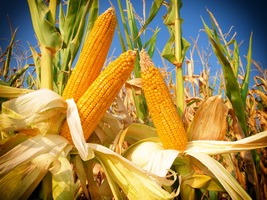
EFSA Reiterates Previous Risk Assessment Conclusion on NK603 Valid and Applicable
June 7, 2017| |
 The European Food Safety Authority (EFSA), by request of the European Commission (EC), assessed the 2016 scientific publication by Robin Mesnage et al., including its relevance for the risk assessment of maize NK603. The publication analyzed the proteomic and metabolomic profiles of maize NK603 kernels and compared those to a non-GM maize line used as comparator. The authors quantified the levels of expression of the CP4 EPSPS protein in maize NK603, and concluded that maize NK603 is compositionally non-equivalent to a non-GM maize comparator.
The European Food Safety Authority (EFSA), by request of the European Commission (EC), assessed the 2016 scientific publication by Robin Mesnage et al., including its relevance for the risk assessment of maize NK603. The publication analyzed the proteomic and metabolomic profiles of maize NK603 kernels and compared those to a non-GM maize line used as comparator. The authors quantified the levels of expression of the CP4 EPSPS protein in maize NK603, and concluded that maize NK603 is compositionally non-equivalent to a non-GM maize comparator.
EFSA found severe shortcomings in the study's experimental design, as well as uncertainties on the suitability of the test material used by the authors. Furthermore, the interpretation of the results is incomplete, since the authors did not take into account natural variability of the endpoints analyzed. EFSA is also uncertain about the potential contamination of the study materials by pathogens and the related confounding effects on the study results.
EFSA concludes that results published by Mesnage et al. are insufficient to necessitate the revision of the risk assessment conclusions on maize NK603, and does not presents any new scientific information to invalidate the previous EFSA GMO Panel risk assessment conclusions of maize NK603. Therefore, EFSA considers that the previous risk assessment conclusions on maize NK603 remain valid and applicable.
The open-access Technical Report is available at EFSA Supporting Publications.
| |
Biotech Updates is a weekly newsletter of ISAAA, a not-for-profit organization. It is distributed for free to over 22,000 subscribers worldwide to inform them about the key developments in biosciences, especially in biotechnology. Your support will help us in our mission to feed the world with knowledge. You can help by donating as little as $10.
-
See more articles:
-
News from Around the World
- Report Shows 20 Years of Economic and Environmental Benefits from Biotech/GM Crops
- Public Learns about Biotech for Climate Smart Agriculture at World Environment Day Commemoration in Uganda
- Tanzanian Farmers Urge Gov't to Hasten Delivery of GE Crops
- Salk Scientists Help Plants Pump Iron Using Gene Variants
- Taking the Initial Step Towards Dev't of Epigenetically Modified Cotton
- Current Advances in Genome Editing Technology and its Application in Crop Improvement
- Australia's OGTR Receives License Application for Commercial Release of GM DHA Canola
- Australia's Gene Technology Regulator Shares Regulatory Practices with Vietnam
- India's National Academy of Agricultural Sciences Endorses Commercial Release of GM Mustard
- Scientists Discover Plant 'Brain' Controlling Seed Development
- EFSA Reiterates Previous Risk Assessment Conclusion on NK603 Valid and Applicable
-
Research Highlights
- SbNrat1 Gene in Sorghum Functions for Aluminum Tolerance
-
Announcements
- Biosafety in Plant Biotechnology Course
-
Plant
- Development of Gene-Specific Rice Mutants via AvrXa23-based TALENs
- Nagoya University Develops Highly Efficient CRISPR-Cas9 Vector for Arabidopsis
-
Read the latest: - Biotech Updates (February 4, 2026)
- Gene Editing Supplement (January 28, 2026)
- Gene Drive Supplement (February 22, 2023)
-
Subscribe to BU: - Share
- Tweet
